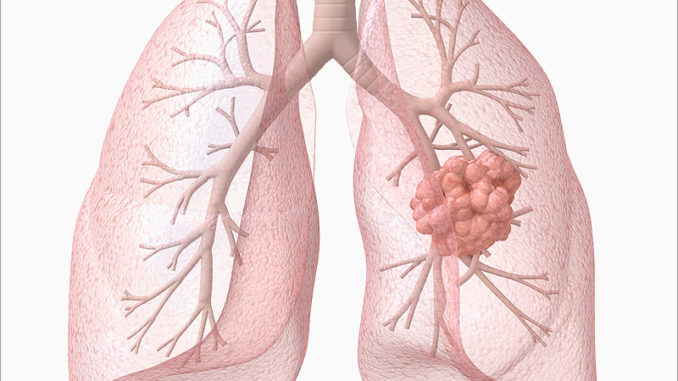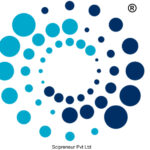
Phase III Study Showed Roche’s Alecensa Is Superior To Crizotinib For Lung Cancer
Alecensa lowered the risk of tumour spread or growth in the brain or central nervous system
Alecensa lowered the risk of tumour spread or growth in the brain or central nervous system
- Data will be simultaneously published in the New England Journal of Medicine, and featured in the official ASCO press programme
By: Roche News
Roche (SIX: RO, ROG; OTCQX: RHHBY) announced that the phase III ALEX study showed Alecensa® (alectinib) significantly reduced the risk of disease worsening or death (progression-free survival, PFS) by more than half (53%) compared to crizotinib when given as initial (first-line) treatment for people with anaplastic lymphoma kinase (ALK)-positive advanced non-small cell lung cancer (NSCLC) (hazard ratio (HR)=0.47, 95% CI: 0.34-0.65, p<0.0001).1 Median PFS reported by the investigators, the primary endpoint of the study, was not yet reached in people who received Alecensa (95% CI: 17.7-not reached) versus 11.1 months (95% CI: 9.1-13.1 months) in those who received crizotinib.1 Median PFS assessed by an independent review committee (IRC), a secondary endpoint, was 25.7 months (95% CI: 19.9-not reached) for people who received Alecensa versus 10.4 months (95% CI: 7.7-14.6 months) for people who received crizotinib (HR=0.50, 95% CI 0.36–0.70; p<0.0001).1 The safety profile of Alecensa was consistent with that observed in previous studies.1
“Alecensa reduced the risk of disease progression by more than half and reduced the risk of cancer spreading to or growing in the brain, which can have devastating effects for patients,” said Sandra Horning, MD, Roche’s Chief Medical Officer and Head of Global Product Development. “These results significantly improve upon the standard of care for this disease, extending the average time that people lived without their disease worsening from less than a year to more than two years. We are submitting these data to regulatory authorities around the world.”

The global, randomised phase III ALEX study also demonstrated that Alecensa reduced the risk of disease progression in the central nervous system (CNS) by 84% (HR=0.16, 95% CI: 0.10-0.28; p<0.0001).1 The 12-month cumulative rate of CNS progression for people with or without existing CNS metastases at baseline was 9.4% (95% CI: 5.4-14.7%) for people treated with Alecensa and 41.4% (95% CI: 33.2-49.4%) for people treated with crizotinib.1
The official ALEX data presentation at the American Society of Clinical Oncology (ASCO) Annual Meeting will be on Tuesday 6 June 2017, at 12:09 – 12:21 CDT (Abstract #9008). The data will be simultaneously published in the New England Journal of Medicine, and will be featured in the official ASCO press programme on Monday 5 June 2017 at 08:00 CDT.
Data from the ALEX study will be submitted to global health authorities, including the US Food and Drug Administration (FDA), which in September 2016 granted Alecensa Breakthrough Therapy Designation (BTD) for the treatment of people with advanced ALK-positive NSCLC who have not received prior treatment with an ALK inhibitor.
Alecensa is approved as a monotherapy for people with ALK-positive NSCLC who have progressed on or are intolerant to crizotinib in Europe, the US and ten other countries globally. Alecensa is also approved in Japan for people whose tumours were advanced, recurrent or could not be removed completely through surgery (unresectable). In the US, Alecensa was granted accelerated approval by the FDA in December 2015 for the treatment of people with ALK-positive NSCLC who have progressed on or are intolerant to crizotinib.2 The ALEX study is part of the company’s commitment in the US to convert the current accelerated approval of Alecensa in people with ALK-positive, metastatic NSCLC who have progressed on or are intolerant to crizotinib to a full approval as an initial treatment.
In the European Union, Alecensa was granted conditional marketing authorisation in February 2017 as monotherapy for people with ALK-positive advanced NSCLC previously treated with crizotinib.3 Under the provisions of the conditional EU approval, Roche is submitting the ALEX study as the specific obligation to obtain full approval of Alecensa as an initial treatment for ALK-positive advanced NSCLC.
About the ALEX study4
ALEX (NCT02075840/B028984) is a randomised, multicentre, open-label phase III study evaluating the efficacy and safety of Alecensa versus crizotinib in treatment-naïve people with ALK-positive NSCLC whose tumours were characterised as ALK-positive by the VENTANA ALK (D5F3) CDx Assay, a companion immunohistochemistry (IHC) test developed by Roche Tissue Diagnostics. People were randomised (1:1) to receive either Alecensa or crizotinib. The primary endpoint of the ALEX study is PFS as assessed by the investigator and secondary endpoints include: IRC-assessed PFS, time to CNS progression, objective response rate (as defined by RECIST criteria), duration of response, overall survival, health-related quality of life and safety. The multicentre study was conducted in 303 people across 161 sites in 31 countries.4 Results include1:
- Alecensa reduced the risk of disease worsening or death (PFS) by 53% compared to crizotinib (HR=0.47, 95% CI: 0.34-0.65, p<0.0001).
- Investigator-reported median PFS (the primary endpoint) was not yet reached in the Alecensa arm (95% CI: 17.7 -not reached) versus 11.1 months (95% CI: 9.1-13.1 months) in the crizotinib arm.
- IRC-reported median PFS (a secondary endpoint) was 25.7 months (95% CI: 19.9-not reached) in the Alecensa arm versus 10.4 months (95% CI: 7.7-14.6 months) in the crizotinib arm (HR=0.50, 95% CI: 0.36-0.70; p<0.0001).
- Alecensa reduced the risk of progression in the CNS by 84% (HR=0.16, 95% CI: 0.10-0.28; p<0.0001).
- The 12-month cumulative rate of CNS progression for people with or without existing CNS metastases at baseline was 9.4% (95% CI: 5.4-14.7%) for people treated with Alecensa and 41.4% (95% CI: 33.2-49.4%) for people treated with crizotinib.
- Overall survival (OS) data are currently considered immature with only about a quarter of events being reported.
- Grade 3-5 adverse events (AEs) were less frequent in the Alecensa arm (41%) compared to the crizotinib arm (50%). In the Alecensa arm, the most common Grade 3-5 AEs (≥5%) were increased liver enzymes (alanine transferase and aspartate transferase; 5%) and decreased red blood cells (anaemia; 5%). AEs leading to discontinuation (11% vs. 13%), dose reduction (16% vs. 21%) and dose interruption (19% vs. 25%) were all lower in the Alecensa arm compared to the crizotinib arm.
About Alecensa
Alecensa (RG7853/AF-802/RO5424802/CH5424802) is an oral medicine created at Chugai Kamakura Research Laboratories and is being developed for people with NSCLC whose tumours are identified as ALK-positive. ALK-positive NSCLC is often found in younger people who have a light or non-smoking history.5 It is almost always found in people with a specific type of NSCLC called adenocarcinoma.5 Alecensa is currently approved in the United States, Europe, Kuwait, Israel, Hong Kong, Canada, South Korea, Switzerland, India, Australia, Singapore and Taiwan for the treatment of advanced (metastatic) ALK-positive NSCLC whose disease has worsened after, or who could not tolerate treatment with, crizotinib and in Japan for people with ALK-positive NSCLC.
The global phase III ALEX study of Alecensa includes a companion test developed by Ventana. Alecensa is marketed in Japan by Chugai Pharmaceutical, a member of the Roche Group.
About Roche in lung cancer
Lung cancer is a major area of focus and investment for Roche, and we are committed to developing new approaches, medicines and tests that can help people with this deadly disease. Our goal is to provide an effective treatment option for every person diagnosed with lung cancer. We currently have four approved medicines to treat certain kinds of lung cancer and more than ten medicines being developed to target the most common genetic drivers of lung cancer or to boost the immune system to combat the disease.
About Roche
Roche is a global pioneer in pharmaceuticals and diagnostics focused on advancing science to improve people’s lives. The combined strengths of pharmaceuticals and diagnostics under one roof have made Roche the leader in personalised healthcare – a strategy that aims to fit the right treatment to each patient in the best way possible.
Roche is the world’s largest biotech company, with truly differentiated medicines in oncology, immunology, infectious diseases, ophthalmology and diseases of the central nervous system. Roche is also the world leader in in vitro diagnostics and tissue-based cancer diagnostics, and a frontrunner in diabetes management.
Founded in 1896, Roche continues to search for better ways to prevent, diagnose and treat diseases and make a sustainable contribution to society. The company also aims for improving patient access to medical innovations by working with all relevant stakeholders. Twenty-nine medicines developed by Roche are included in the World Health Organization Model Lists of Essential Medicines, among them life-saving antibiotics, antimalarials and cancer medicines. Roche has been recognised as the Group Leader in sustainability within the Pharmaceuticals, Biotechnology & Life Sciences Industry eight years in a row by the Dow Jones Sustainability Indices (DJSI).
The Roche Group, headquartered in Basel, Switzerland, is active in over 100 countries and in 2016 employed more than 94,000 people worldwide. In 2016, Roche invested CHF 9.9 billion in R&D and posted sales of CHF 50.6 billion. Genentech, in the United States, is a wholly owned member of the Roche Group. Roche is the majority shareholder in Chugai Pharmaceutical, Japan. For more information, please visit www.roche.com.
All trademarks used or mentioned in this release are protected by law.
References
- Shaw AT, et al. Alectinib versus crizotinib in treatment-naïve advanced ALK-positive non-small cell lung cancer (NSCLC): Primary results of the global phase III ALEX study. Presented at: ASCO Annual Meeting; 2017 Jun 2-6; Chicago, IL, USA. Abstract #LBA9008.
- FDA. FDA approves new oral therapy to treat ALK-positive lung cancer. [Internet; cited 2017 May 22]. Available from: https://www.fda.gov/NewsEvents/Newsroom/PressAnnouncements/ucm476926.htm.
- EMA. Alecensa authorisation details. [Internet; cited 2017 May 22]. Available from: http://www.ema.europa.eu/ema/index.jsp?curl=pages/medicines/human/medicines/004164/human_med_002068.jsp&mid=WC0b01ac058001d124.
- ClinicalTrials.gov. A Study Comparing Alectinib With Crizotinib in Treatment-Naive Anaplastic Lymphoma Kinase-Positive Advanced Non-Small Cell Lung Cancer Participants (ALEX) [Internet; cited 2017 May 22]. Available from: https://clinicaltrials.gov/ct2/show/NCT02075840.
- Gridelli C, et al. ALK inhibitors in the treatment of advanced NSCLC. Cancer Treatment Reviews. 2014;40:300-306.







Leave a Reply